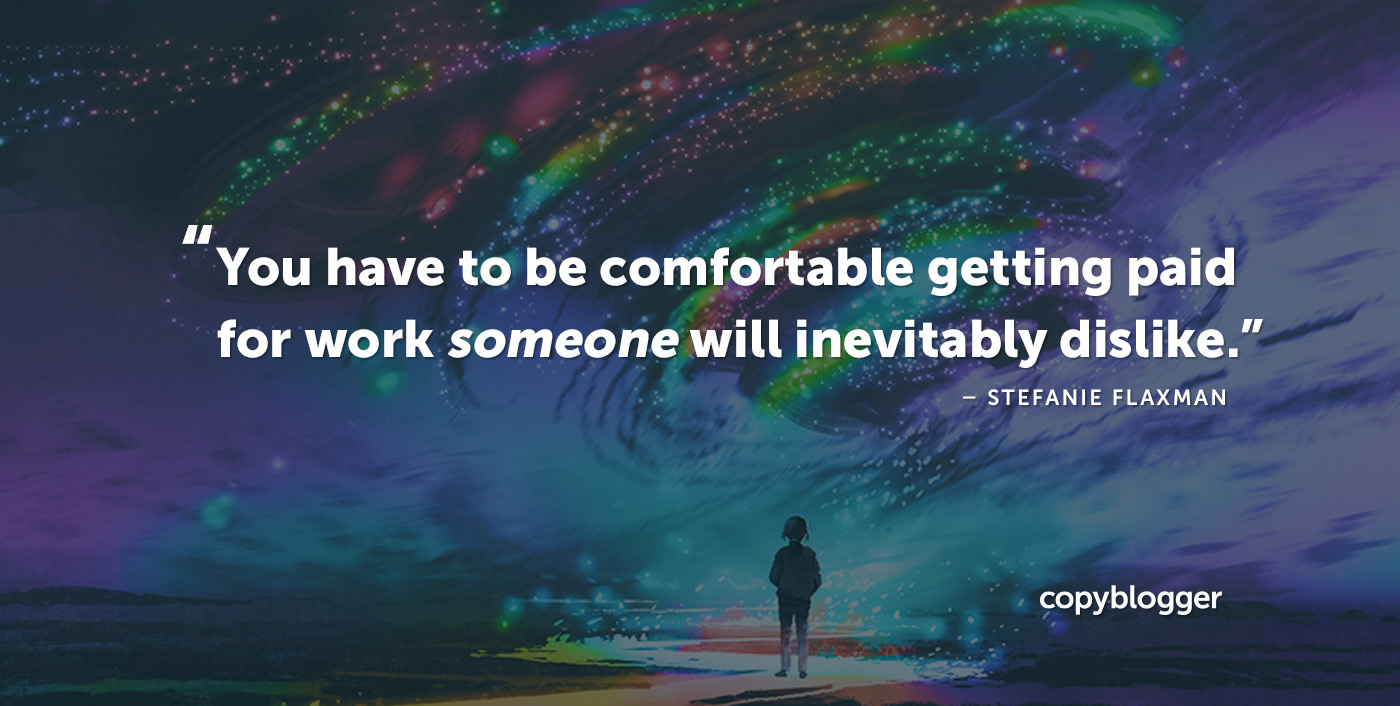I’ve been interested in philosophy of art for quite some time.
But I’ve only been exploring philosophy of professional art for the past several years.
There is no objective “right” or “wrong” when it comes to art.
Unlike an accountant completing the math equation 2 + 2 = 4 (certainly correct), an artist does not know how the public will receive their innovative equation (ugly? beautiful?).
And that uncertainty naturally affects a human being’s confidence and self-worth in business.
What’s more maddening is that for every person who calls an artistic creation “ugly,” there’s another person who will call it “beautiful.”
For every person who says a concept is “stupid,” there’s another who will perceive it as “groundbreaking.”
For every person who is “bored,” there’s another who is “entertained.”
No wonder (well-intentioned) people in your life have tried to talk you out of pursuing content marketing to build an online business.
You have to be comfortable getting paid for work someone will inevitably dislike.
That is the nature of professional art, and that is the nature of creative business.
Will the “real artist” please stand up?
Impostor syndrome prevents many artists from evolving into professional creatives.
- It’s the feeling that we’re not good enough.
- It’s the feeling that someone else knows what they’re doing.
- It’s the feeling that criticism is just too painful.
But the person who we think isn’t an impostor — the person who is good enough, knows what they’re doing, and doesn’t mind criticism — is also sometimes paralyzed by their own potential shortcomings and looking to someone else as “the real deal.”
The root of impostor syndrome in creative business is the false belief that your art is not worth money because someone might not like it.
And the quality that separates a recreational artist from a professional artist is that the professional feels worthy of getting paid for subjective work.
They know their creations are not going to please everyone — and they know they deserve to be paid anyway, simply because of their high level of thought and care for their work.
So, let’s tap into two steps professional artists must practice to achieve that state of confidence.
Step #1: Trust that the people who don’t like your work don’t matter
I don’t know if we ever fully achieve this step.
But it’s something we must try to understand every day.
Deepening your appreciation for the people who do matter helps you refocus your energy in a productive way.
Because, ultimately, fixating on criticism doesn’t grow your audience or your business.
Only the momentum you get from doing great work does that, which leads us to …
Step #2: Embrace the value you produce
When you get clear on the values-driven why that motivates you, you’d rather make progress than get wrapped up in your own self-doubt.
Many people might not like the articles I post and videos I publish regularly. If I focused on that possibility, it’d be pretty hard to be a prolific content creator.
Instead, I focus on the possibility of helping other creative people do meaningful work they love. One paragraph at a time. One sentence at a time. One word at a time.



Reader Comments (10)
A great article Stefanie, and one that’s so close to my heart. I suffer from impostor syndrome every day and it’s prevented me from moving forward with any type of creative business.
But notice I said ‘prevented’… I’m slowly learning to embrace my flawsomeness and in 2019 I know I will break the binds of impostor syndrome and will create and grow my web content writing business. Thanks for sharing your knowledge.
Flawsomeness! That’s terrific, Mike!
It takes time, but it’s great to hear that you’ve started your journey. 🙂
Great stuff… I recently started reading your work and I’m quickly becoming a fan. Keep it up! I’m a newish freelancer and have dealt with imposter syndrome just as you describe. My efforts to work through it relate to my efforts to simply feel intrinsically worthy as a human, rather than base my worth on what other people think of what I do or create. I’ve had high highs and lows lows… It’s quite a ride!
It is, Alison!
Interesting how business lessons are often really life lessons as well.
Great post!
I’ve never heard of “Impostor Syndrome” before I read this article. And in fact, I am also a victim of this syndrome.
I have many ideas and posts in the draft that I always hesitate to publish because I think that they are just rubbish and of no use at all. But this post has encouraged me to publish those seemingly rubbish things on my blog.
Thanks, Stephanie, for this fabulous post. You’ve changed my way of thinking.
This is so spot on for me! Thanks for this, Stefanie!
I’m pretty sure Neil Gaiman and Kate Winslet have openly discussed suffering from imposter syndrome in the past. I get it as an author, looking at other people and thinking “they seem to find it so easy – one of these days people will realise I don’t know what I’m doing”, but you just have to remind yourself that those same people are probably looking at you and thinking the same thing!
That reminder is constant work! But it’s worth it in order to keep producing and growing. 🙂
I don’t work in a creative field, not really. Back end computer programming does not involve much style, but choosing the right style of programming can mean one or both of how quickly can you write it, and how quickly will it run, to end in ‘way too long’.
I often worry that the work I am doing will be replaced by someone who writes code that will do the same thing in less time.
But I keep going, because it is what I do.
Wonderful topic! Where Imposter Syndrome really hits home for me is in my billing. At industry meetups, I frequently meet less experienced, less accomplished folks who charge double my fee and think nothing of it. Yet, too often, I will undercharge and over deliver on projects. As you mentioned, some of us suffer from this ‘syndrome’ because we don’t yet feel that we measure up: 1) we can identify industry leaders whose abilities appear to exceed ours and 2) we are well aware of areas we want to improve at. But another reason may be that, after years of studying, working and honing our skills, our abilities (which may appear overwhelming and intimidating to others) seem mundane and unremarkable to us. Thanks again for your excellent, thought-provoking post.
This article's comments are closed.